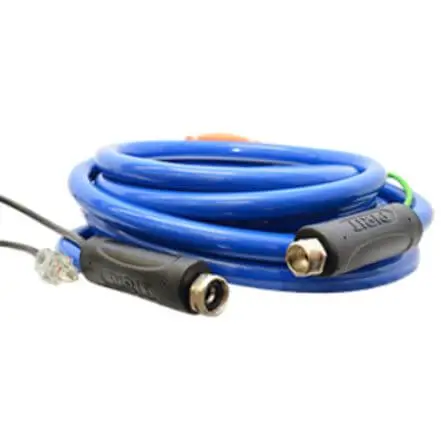Hey! This site is reader-supported and we earn commissions if you purchase products from retailers after clicking on a link from our site.
In this article, we’ll look at the best ways to maintain and troubleshoot your RV hot water system and its RV hot water heater. For some people that rely upon solar hot water systems such as water bags that hang outside and heat the water naturally, some of these issues may not apply to you, but if you are like most RVers that rely upon electric or propane to heat your water, then you may be interested in some of these RV water heater troubleshooting tips.
Table of Contents
- I’m Not Getting Any Hot Water, What Should I Do?
- The Valves Are Right, the Water Is Running…and Still No Cold Water. Now What?
- My Water Is Hot, but I Hear This Loud Roaring Sound When I Want to Use It. What’s That?
- I Sometimes See Water Dripping From My RV Water Heater Access Panel. What Causes That?
- My Hot Water Supply Flow Is Slow, Is That Normal?
- My Water Has a Foul Odor, What Can I Do About That?
I’m Not Getting Any Hot Water, What Should I Do?
Not getting any hot can depend on several different factors, but the two most important factors to consider first is if you are getting a water supply that is cold when the faucet is turned on, or if you are getting no water through your faucet when it is opened. Don’t panic just yet, both problems are usually easily diagnosed with this RV water heater troubleshooting guide.
If you are getting a water supply to your cold water valves, then you can rule out your water pump if you are not hooked up to a continuous pressurized water source such as those you would find in most campgrounds that supply you with water.
If your RV water heater tank is full and the system is pressurized or charged and you are still getting cold water through your hot water valves, then the first thing to consider in this scenario is whether your RV water heater is getting supplied with water.
If you follow my articles, you may remember a previous column on winterizing your RV, where I explained the proper way to bypass your water supply to the RV water heater. That said, the first I would do is to check the water supply to my RV hot water heater.
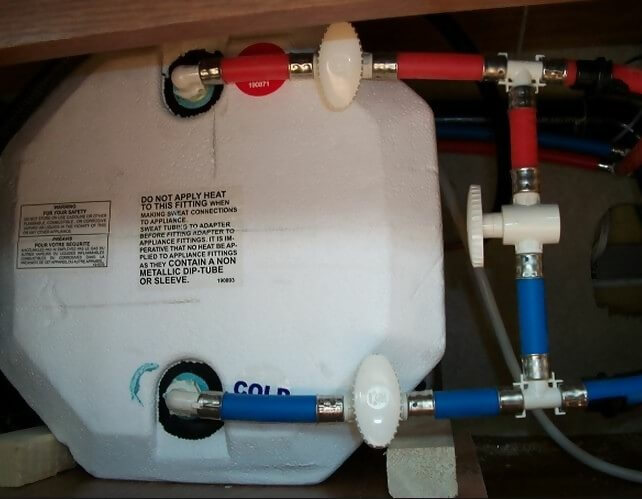
In this illustration, you’ll see that the blue cold-water line valve is in the closed position as is the red line that supplies your hot water.
You may also notice that the bypass line that runs between them has a valve that is open. When your water system is configured like this, you are bypassing the RV water heater and any RV hot water faucet in your system will not work.
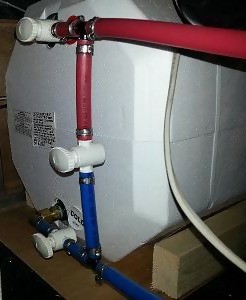
The proper way to configure the water flow through RV’s supply system is to configure the flow as shown here.
In this photo, you can see that the inline valve on the bypass line is closed and the cold-water supply line is open, as is the hot water supply line. If your RV water heater is not configured like this, then you will not receive a hot water supply.
Pro tip: Inline valves are valves that have handles and when the handle is “in-line” with the pipe or hoses, it is open such as the ones shown in these two photos
The Valves Are Right, the Water Is Running…and Still No Cold Water. Now What?
If you’re getting a solid supply of water through your hot water faucets and you are still without hot water, then the next step is to look at your power supply to the RV water heater. Is your RV water heater getting the necessary electric supply to operate properly?
This is especially important if you have an electric water heater, but it can be equally important for propane models. For example, an electric water heater needs an electrical charge to operate and heat the elements necessary to keep your water hot when you want to access it.
The same can be said for propane systems, except that they rely on your RV’s electrical system to supply a charge to an ignitor that lights a propane system when the water’s temperature drops below a set level.
For those reasons, each type of system has an ignitor that activates your RV water heater and for those reasons, a thorough inspection of the ignitor should be conducted. If you should find your RV water heater ignitor to be ineffective during its examination, then you should replace it immediately.
My Water Is Hot, but I Hear This Loud Roaring Sound When I Want to Use It. What’s That?
This is a problem with propane-heated water, and you should address it as soon as possible. I would also recommend that you limit the use of your RV water heater until you have resolved the problem. Generally, when your propane burners are making a loud sound when they are burning, it’s because they are burning too lean.
In other words, the supply of oxygen overpowers the supply of propellant and there isn’t the correct balance of the gases necessary to maintain the proper balance for your system to work correctly.
While I don’t usually recommend that people who aren’t qualified in the heating and cooling industry make repairs involving propane appliances, adjusting the airflow to your propane heater is usually a simple fix. One basic rule to keep in mind is that your flame should be blue in color. Too much or too little oxygen will cause your flame to be mostly yellow or orange.
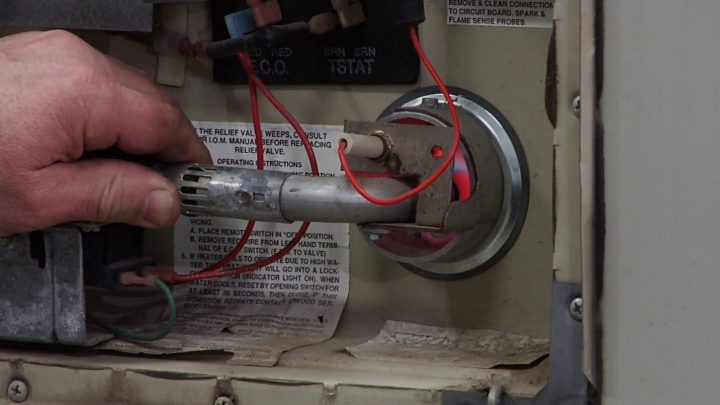
In the photo above, you will see what appears to be a sleeve on the fresh air intake line and that’s exactly what it is. Just to the right of the vents which regulate the proper airflow to the burner is a small set screw. By loosening this screw, you can slide the sleeve to the right or left which will add or reduce the fresh air supply to the burner and this will adjust the proper flame for your burner.
Remember, too much oxygen will cause your flame to roar and be blue with yellow and orange in color, and too little oxygen will cause your flame to be mainly yellow. Should the latter occur, your mixture is too rich, and your burner will produce excessive solid waste, and this is referred to as shooting.
Sooting can be easily diagnosed because there will be a buildup of black soot above the exhaust port on the outside of your RV where the access panel to your RV water heater is located.
I Sometimes See Water Dripping From My RV Water Heater Access Panel. What Causes That?
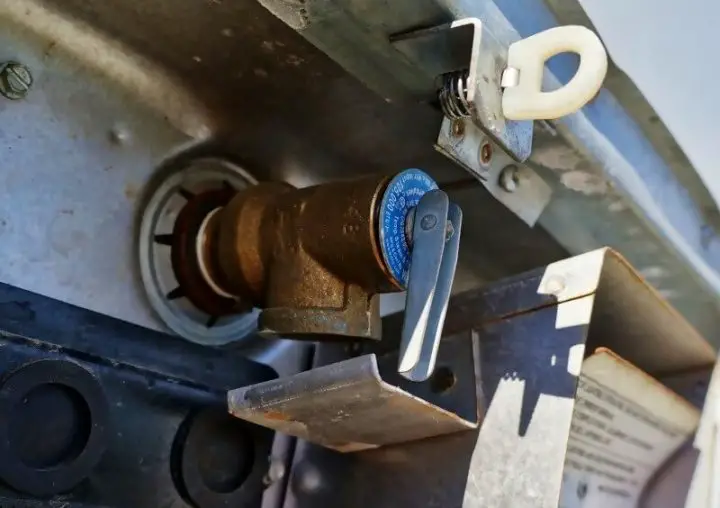
All RV water heaters, whether they are for homes or RVs, are equipped with a relief valve. As water heats, it begins to expand and produce steam, and this produces pressure. Relief valves are designed to eliminate this pressure automatically and when working properly it’s not unusual to see them “leaking”.
However, this is a sign that you have your RV water heater’s temperature set too high.
Reduce the temperature settings on your RV water heater and this should correct the problem. If it continues to leak, then I would suggest you properly replace the valve, and this should solve your problem.
My Hot Water Supply Flow Is Slow, Is That Normal?
Usually, the cause of low pressure is a result of too many valves or faucets opened at the same time. This is especially true when you are boondocking and relying upon your water pump to supply the pressure to open faucets. My advice here would be to use only one water faucet at a time or if the problem persists you might want to consider installing a water pump that supplies more pressure, like the one below.
- Positive Displacement 3 Chamber Diaphragm Pump
- Check Valve: (1-Way Operation) Prevents Reverse Flow
- CAM: 3.5 Degree
Last update on 2025-07-26 / Affiliate links / Images from Amazon Product Advertising API
My Water Has a Foul Odor, What Can I Do About That?
Foul odors in your water system are usually caused by stale or old water in your tanks or in some cases where you filled your tanks with water. I’ve traveled all over this country and on occasion I have filled my freshwater tanks with water that I thought tasted odd. This is not uncommon as different parts of this country have different geological water tables that contain different elements that will ultimately affect the taste of the water.
Naturally, I would recommend a good water filter for your system. However, you should also consider flushing out your water system should this foul odor or taste persist. In a previous article about sanitizing your water system, I explained how to properly do this and why it’s important to keep your water system clean and properly sanitized you should take a look at that article for tips on cleaning your water system.
Last update on 2025-07-26 / Affiliate links / Images from Amazon Product Advertising API
If you’ve troubleshot your RV water heater and concluded it’s not in the best shape and you’re now looking for a replacement water heater for your RV – I recommend you check out Mike’s review of the best water heaters for your RV on the market today right here.
As always folks, thanks for reading my columns. I wish you safe travels and I hope to see you on the road sometime.
Troubleshooting other parts of your RV? Check out these guides too. And be sure to read our full article on your RV plumbing setup.






